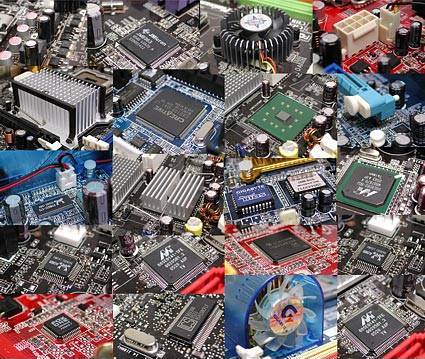Six 975X Enthusiast Motherboards for Today and Tomorrow
Conclusion: Intel Inside Almost Wins
All six motherboards worked reliably during the three-week test period, and they performed more or less alike, although there were some slight differences that vary by application. From a hardware point of view, the boards come with all the features a power user might require and, again, you can only find differences in the details. We do not advise against any of these boards, but they each do have advantages and disadvantages that we would like to point out.
Both Asus motherboards performed well, building on the Asus tradition of delivering quality products. Both the P5WD2-E and the P5WDG2-WS run slightly overclocked, which is why they dominate several benchmark disciplines. We have to criticize the slow software downloads and mention the fact that other motherboard makers have closed ranks. Gigabyte, for example, offers more features and more equipment for less money. However, the P5WDG2-WS is the only workstation-type motherboard with two PCI-X slots and a comforting 8-phase voltage regulator.
Gigabyte's G1975X is not perfect either, although it comes with the most impressive feature set (and factory overclocking as well). The software package is somewhat out of date, and we had trouble installing the Creative Audigy drivers, although this sound processor is the most sophisticated in this roundup. Apart from that, the fancy cooling solution, while being noisy, does a very efficient job.
Foxconn slowly but surely is making its way from boring business-class motherboards to products that are appealing to the enthusiast. The software package and hardware features (including overclocking items) are comparable to what the competitors offer. However, we still found a few BIOS bugs, and would not want to rely on a rather simple 3-phase voltage regulator.
MSI's 975 Platinum H offers good software support and also have a nice Windows-based update mechanism. The board we got was a sample version, so the BIOS entry to alter the CPU core voltage is not missing in the final board revision. Also the ATX connector is changed to support power supplys without modifiying the connector.
Intel managed to compile the most attractive 975X package by unreservedly addressing the enthusiast, offering ease of use (especially with respect to BIOS updates) and providing powerful software tools. What's most surprising, though, is the comprehensive overclocking support, which matches the Asus and Gigabyte offerings, and includes a hardware stress test tool to verify stability of your settings. Finally, it is a no-noise product, and only some BIOS and software bugs prevent us from awarding it fully.
Join our discussion on this topic
Get Tom's Hardware's best news and in-depth reviews, straight to your inbox.
Current page: Conclusion: Intel Inside Almost Wins
Prev Page IMD (Swept Tones)
Patrick Schmid was the editor-in-chief for Tom's Hardware from 2005 to 2006. He wrote numerous articles on a wide range of hardware topics, including storage, CPUs, and system builds.
